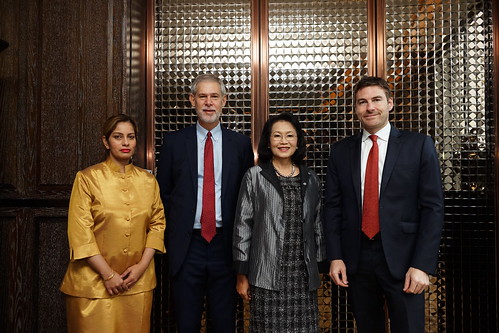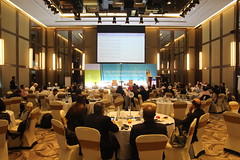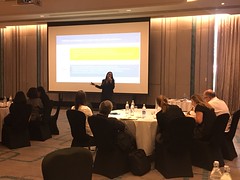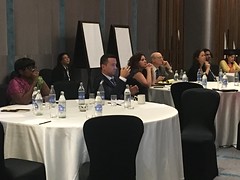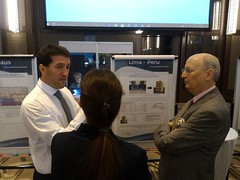Event Summary
The annual Comprehensive Financial Solutions for City Resilience Conference organized by the World Bank Group’s City Resilience Program (CRP) brings together city officials, private sector experts, donors and investors to prepare for ambitious investments in urban resilience. The aim is to refine existing investment ideas and expand the financing options available for cities. By combining technical workshops with hands-on planning sessions over a five-day period, city leaders will be equipped to further develop their investment plans and identify opportunities for private sector financing.
Strengthening urban resilience is a multi-billion dollar agenda. Most city governments lack the financial resources and technical expertise to maximize financing options and pursue the type of infrastructure investments that are necessary to build urban resilience in an impactful, sustainable way. The World Bank Group’s City Resilience Program (CRP)CRP aims to provide city governments with the tools to pursue ambitious infrastructure investment by connecting them with new and additional sources of capital, including private capital and institutional investors.
The World Bank Group’s (WBG) City Resilience Program (CRP) was launched in June 2017. CRP helps cities achieve urban resilience through is an effort to assist city governments to build greater resilience to climate and disaster risks. For many major cities in the world, strengthening urban resilience is a multibillion dollar agenda that requires strong partnerships and new sources of capital. Oftentimes, cities are held back from pursuing the necessary investments because they lack the technical expertise and/or the access to capital to finance them. CRP tries to fill that gap by i. leveraging the World Bank’s broad set of sectoral expertise in designing urban resilience projects, and ii. better connecting cities to the necessary financing. It is in this sense that CRP seeks to act as the bankers of the city, and to facilitate strategic investments that address the vulnerabilities and risks that cities face in a holistic way.
Conference Objectives & Deliverables
The Comprehensive Financial Solutions for City Resilience Conference provides a forum for city leaders to interact with their peers, World Bank teams, financial advisory firms, and potential investors to:
- learn about the suite of tools available to cities for raising private capital, and understanding the regulatory and financial environment necessary to utilize these tools in an effective manner;
- exchange ideas on expanding the scope of potential investments; and
- identify and structure concrete investment opportunities with a potential for private sector financing.
The Conference forms part of the CRP’s broader engagement to assist cities to expand their financing options and prepare a concrete capital investment plan. Prior to arriving in Bangkok, World Bank staff, in consultation with city officials, will have completed a Rapid Capital Assessment for each city that will give an indication of the city’s opportunities to access private capital investments. The completed Rapid Capital Assessment will be used to guide the discussions and workshops during the conference, and will be further developed as delegates learn more about the various tools and options for private capital financing available to them.
The learning component of the conference will focus on tools available for cities to access private investment, in particular commercial debt, Public Private Partnerships(PPP)s and concessions, and Lland Vvalue Ccapture (LVC). The learning modules will outline the specificities of each instrument and the legal and regulatory environment that is necessary to successfully implement them. Private sector experts will combine technical instructions with successful examples from other cities to illustrate best practices and lessons learned.
Throughout the conference, city delegates together with World Bank staff will work on developing and/or refining a concrete infrastructure investment plan. City delegates will be encouraged to be ambitious both in terms of the technical design and the financial scope of the proposed investment. World Bank staff will be available to assist in the development of the investment plan and in identifying sources of capital to finance them, including World Bank lending, co-financing opportunities and private capital mobilization (see Capital Mobilization Structure below). The conference provides an entry point for wider support and technical assistance through CRP, and seeks to strengthen a peer network around city infrastructure capital financing options.
Participants
The Conference will convene city officials from 2435 cities from Algeria, Argentina, Bolivia, Colombia, Ghana, Morocco, Myanmar, Panama, Peru, South Africa, Turkey and others. Other interested cities from East Asia will be invited. The World Bank delegations will consist of task team leaders working in the respective cities, along with senior management and technical experts in infrastructure finance, capital budgeting, land value capture, PPPs/concessions and debt. Financial advisors such as Deloitte, EY, KPMG and PWC, along with other firms in the investment community such as CDPQ, Hong Kong Investment Authority and Macquarie, will participate to provide expert advice on proposed investment plans. Senior officials from Rockefeller Foundation’s 100 Resilience Cities (100 RC) initiative will also join alongside key donor agencies such as SECO.
Agenda & Presentations
Day 1 (Monday, November 6): Introduction to Comprehensive Financial Solutions for City Resilience
| Time | Subject | Presentations |
|---|---|---|
| 8.15 | Registration and Networking Breakfast | |
| 9:00 | Introduction and Welcome Address | |
| 9:20 | Keynote Address Opening plenary session |
|
| 9:45 | Resilient Bangkok | |
| 10:30 | Tea break | |
| 10:45 | Icebreaker – Cultural Bingo | |
| 11:00 | What the City Resilience Program Offers You: Comprehensive Financial Solutions for City Resilience | |
| 12:30 | Lunch Break | |
| 14:00 | Go Game | |
| 18:30 | Lessons learned and Wrap up | |
| 19:00 | Cocktail Reception & Dinner Go Game Awards |
Day 2 (Tuesday, November 7): Capital Budgeting and Land Value Capture
| Time | Subject | Presentations |
|---|---|---|
| 08:30 | Introduction and overview of day topics and objectives | |
| 08:45 | Fundamentals of Capital Budgeting | |
| 10:45 | Tea break | |
| 11:00 | Project Feasibility / Value for money assessments Cost-Benefit analysis and project feasibility assessments Designing a business case for infrastructure investment Case studies: efficient capital budgeting and project delivery |
Capital budgeting presentation |
| 11:45 | Workshop: Break into small groups to discuss capital investment planning approaches Discussion of cities’ experience in capital investment planning, application of lessons learned from the plenary session |
Capital budgeting exercise |
| 12:30 | Lunch Break | |
| 13:30 | Land value capture: applicability to urban resilience Introduction to how LVC works: Overview of common land- based financing tools that may be of relevance |
Land Value Capture Overview |
| 14.30 | Global practices to raise capital through LVC Case study 1: Sao Paulo Sells Development Rights (Certificates for additional construction potential, or CEPACs) Discuss rationale for, process and key building blocks for Sao Paulo to create system to auction air rights |
Land Value Capture Case Study 1 |
| 14:30 | Global practices to raise capital through LVC Case study 2: Johannesburg Leverages its Real Property Portfolio to Generate Capital, Catalyze Impact Discuss city’s strategy for identifying which real property assets appropriate for alienation and city’s process for raising funds through strategic management of its portfolio |
Land Value Capture Case Study 2 |
| 14:30 | Global practices to raise capital through LVC Case study 3: Re-Positioning a Large-Scale Government Real Property Asset to Generate Social, Economic Returns – New York City’s Brooklyn Bridge Park and Sabarmati Riverfront in Ahmedabad, India |
Land Value Capture Case Study 3 |
| 15:30 | Coffee Break | |
| 15:45 | Global practices to raise capital through LVC Case study 4: Creating Value through Transferring Risk, Opportunity to Private Sector: Long Beach Civic Center in California Discuss rationale, process, challenges, success factors |
Land Value Capture Case Study 4 |
| 15:45 | Global practices to raise capital through LVC Case study 5: Impact Fees: Recovering Direct & Indirect Costs of New Development Discuss rationale, process and implementation challenges for South Africa’s decentralized approach to levy ‘development charges’ as means to recoup additional costs of public services and infrastructure created by new development |
Land Value Capture Case Study 5 |
| 15:45 | Global practices to raise capital through LVC Case Study 6: Funding a new Metrorail Station through Special Assessment – Washington DC Discuss rationale for, process and prerequisites for use of special assessment to fund construction of new station |
Land Value Capture Case Study 6 |
| 16:45-17:30 | Debrief & Facilitated survey to gather open questions, areas where more information needed |
Day 3 (Wednesday, November 8): Land Value Capture and Debt Instruments
| Time | Subject | Presentations |
|---|---|---|
| 8:30 | Goals for day, overview of day’s topics and objectives | |
| 8:45-9:30 | Challenges and success factors for land value capture Overview of factors encouraging and inhibiting implementation of land-based financing, including real estate market demand, legal framework, institutional context, knowledge and management capacity |
Land Value Capture-Recap |
| 10:30 | Tea Break | |
| 10:45 | Breakout session Cities make brief presentations to each other of the key challenge that could be addressed through creative application of land-based financing. Cities provide informal feedback, share experience, ask questions of each other |
|
| 11:30 | Review of LVC section of Phase I questionnaire by each city | |
| 12:30 | Lunch | |
| 13:30 | Introduction to Municipal Finance and Debt Instruments Overview of debt instruments, Debt financing |
Municipal Finance and Debt |
| 14:30 | Group Exercise: Groups apply debt financing options to hypothetical case | |
| 16:15 | Tea Break | |
| 16:30 | Project development: Integrating Financial Solutions into CRP engagement Strategies | |
| 17:15 | Dinner cruise |
Day 4
| Time | Subject | Presentations |
|---|---|---|
| 8.30 | Introduction and overview of day topics and objectives | |
| 9:15 | Debt Instruments (continued) | Municipal Debt Instruments |
| 10:15 | Introduction of City Creditworthiness Self-Assessment Survey | |
| 11:15 | Tea Break | |
| 11:30 | Break into small groups (of 2-3 cities each) to work on applying Debt Instruments in city capital programs | |
| 12:30 | Lunch Break | |
| 13:30 | Public-Private Partnerships (PPP) and Concessions | - PPP Overview - PPP Urban Transport Projects - PPP Wastewater Treatment |
| 15.30 | Break into small groups (of 2-3 cities each) to work on applying concepts discussed during the PPP plenary session | PWC PPP Breakout session |
| 16:30 | Review of Debt and PPP sections of Phase I Capital Assessment Questionnaire by each city | |
| 17:30 | Project “Pitch” development” |
Day 5
| Time | Subject | Presentations |
|---|---|---|
| 8.30 | Introduction and overview of day topics and objectives | |
| 9:00 | Project Marketplace Cities to share their projects with investors/financiers in marketplace format |
|
| 12:30 | Lunch | |
| 13:30 | Project Marketplace (cont.) | |
| Cities to present their CRP Engagement ideas / projects, takeaways from the workshop | ||
| 15:30 | Investor Feedback | |
| Feedback from investors/financiers on project pitches | ||
| 16:30 | Resources + Q&A | |
| What resources are available to cities beyond this workshop? | ||
| Closing Remarks/Thanks | ||
| 19:00 | Reception in honor of Bangkok City |
Conference Outputs
City Rapid Capital Assessments Results
A key feature of CRP is leveraging the WBG’s balance sheet to deliver greater resources to cities and boost bankability of cities’ capital investment programs in cities. This includes securing co-financing from other multilateral development banks and bilateral agencies and maximizing opportunities for crowding in private capital around each investment program.
For the purpose of this assignment, private sector participation in urban infrastructure investments is grouped into three primary modalities as follows:
- Direct lending to a government entity responsible for administering, provision and maintenance of public infrastructure (e.g., general obligation lending, such as through purchase of general obligations bond, as well as structured obligation lending and sub-sovereign commercial debt financing);
- Public-private partnerships (PPP)/concession that encompass various mechanisms of joint delivery of infrastructure projects with use of public and private funds.
- Land value capture, which is a broad set of transaction mechanisms that help public entities to capture land value increases associated with infrastructure upgrades.
The first step toward understanding opportunities and roadblocks for private capital investment in urban infrastructure requires analysis of baseline conditions for infrastructure financing. This indicative assessment represents an initial step for task teams in analyzing local conditions for unlocking private capital for urban infrastructure investment.
This assessment provides a high-level overview of the city on the basis of how respective national and subnational regulatory frameworks empower the city to access domestic and international capital markets, as well as understanding how national and local market fundamentals support leveraging private capital. Opportunities for attracting private capital financing are grouped into three main sources: direct lending from commercial sources, PPP/concessions structuring, and mobilizing equity through land-value capture.
This document presents stop-lights charts for each city participating in the Assessment as well as cross-city summary, indicating prevalent color-coding and related scoring in each of the private sector mobilization modalities: bonds, bank loans, PPP/Concessions, and land-value capture.
Project Pitch Posters
Multimedia (click left and right to see more pictures)
Day 1 |
Day 2 |
Day 2 - Case Study 2 |
Day 2 - Case Study 5 |
Day 3 |
Day 4 |
Day 5 |
Day 1 Go Game |

